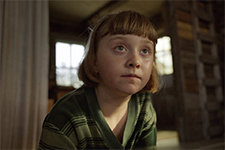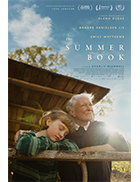The Summer Book
|  Tove Jansson’s beloved 1972 novel The Summer Book (Sommarboken) would seem to pose a number of challenges for a film adaptation, particularly the fact that it does not have an overarching plot or really any kind of narrative structure. Rather, the semi-autobiographical novel is more like a series of scenes or short stories built around two characters—a grandmothers and her 6-year-old daughter—on a remote island that is part of the Gulf of Finland’s archipelagos. As it is fundamentally episodic, it doesn’t lend itself to rising action or developing drama; rather, it just moves along like life itself. The best thing that screenwriter Robert Jones (who, for the past 30 years, has worked entirely in British television) did in adapting Jansson’s novel was not to impose anything artificial on it. Rather, in the words of screenwriter Cesare Zavattini, the godfather of Italian neorealism, it recognizes that “reality is hugely rich, that to be able to look directly at it is enough; and that the artist’s task is not to make people moved or indignant at metaphorical situations, but to make them reflect … on what they and others are doing, on the real things, exactly as they are.” Director Charlie McDowell, whose last film was the clever, but slight crime-drama Windfall (2022), appears to have taken the essence of Zavattini’s words to heart. Like Jansson’s novel, McDowell’s film adaptation is deceptively undramatic, unmoored by narrative structure, and fundamentally episodic, with the only connecting tissue being the mostly unspoken feelings shared by the central characters. This is likely why the girl’s father, who is largely a background figure in the novel, has more prominence in the film, perhaps to underscore the need for familial connection even when everything feels so difficult. The plot, as it were, unfolds on a small island in the Gulf of Finland where a young girl (who looks more like she is 8 or 9) named Sophia (Emily Matthews), her elderly grandmother (Glenn Close), and her father (Anders Danielsen Lie) spend the summer. They are entirely alone on the island, living in a small summer cottage, although it is alive with memories of Sophia’s mother, who recently passed way. Given the setting, it is no small surprise that the film is visually gorgeous; Norwegian cinematographer Sturla Brandth Grøvlen (Another Round, The Innocents) captures the magisterial summer light in ways that feel both transcendent and grounded. Extreme close-ups of various aspects of the natural world—bouncy green moss, frigid ocean waves lapping against a layer of ice that plays like a moving piece of art each time the water recedes—remind us of the importance of the characters’ connection to the physical world. The father, who works as an illustrator, has retreated in his grief, leaving his daughter largely in the hands of her grandmother, who understands the sadness around her and deals with it as best she can while also recognizing that she cannot do it alone. There are only a few moments that directly reference the mother’s absence—a scene in which Sophia confesses her belief that her father hates her since her mother died or the scene in which Sophia angrily leaves a game of cards because of its association with “family”—with most of the characters’ emotions reflect in small, almost imperceptible actions. The unwillingness of the father to engage is his chief characteristic, and we sense that it is not so much out of neglect as it is the paralyzing sense of having no idea what to do. The grandmother, beautifully played by Close as a woman very close to death herself but still vividly alive in all the ways that matter, tries to hold things together and offers Sophia glimpses of how beautiful the world can be, whether that be through the care she takes with the wild moss that grows on the island or an adventure where they row to another island and try to hide from the family that is summering there. There is one distinctly dramatic sequence where they visit another island with a lighthouse and the father is caught in a rowboat out in a storm and there is suspense as to whether he will make it back alive; the sequence works in a very conventional sense, which makes it feel uniquely out of place, as if it came in from another film. The rest of The Summer Book, though, is very much of a piece. And, while it doesn’t quite reach the emotionally sublime heights of other recent films that have mined similar territory with a minimalistic approach— Colm Bairéad’s The Quiet Girl (2022) and Céline Sciamma’s Petite Maman (2022) being the exemplars—those who have the patience and willingness to engage with it while it confronts enormous themes (life, death, family, memory, trauma) through small actions and quiet moments will find it an emotionally moving experience. Copyright © 2025 James Kendrick Thoughts? E-mail James Kendrick All images copyright © Music Box Films |
Overall Rating: 

 (3)
(3)


